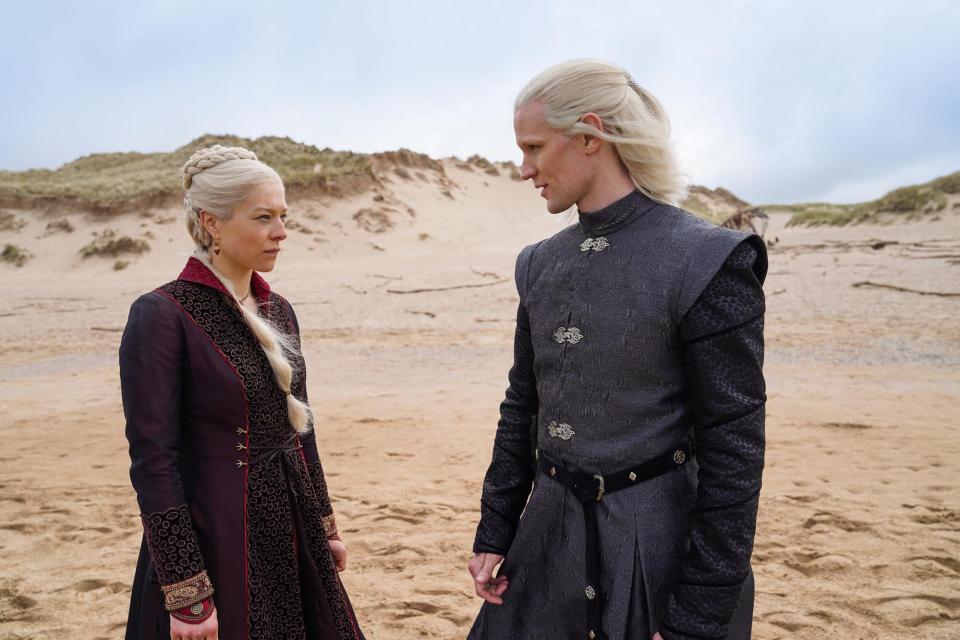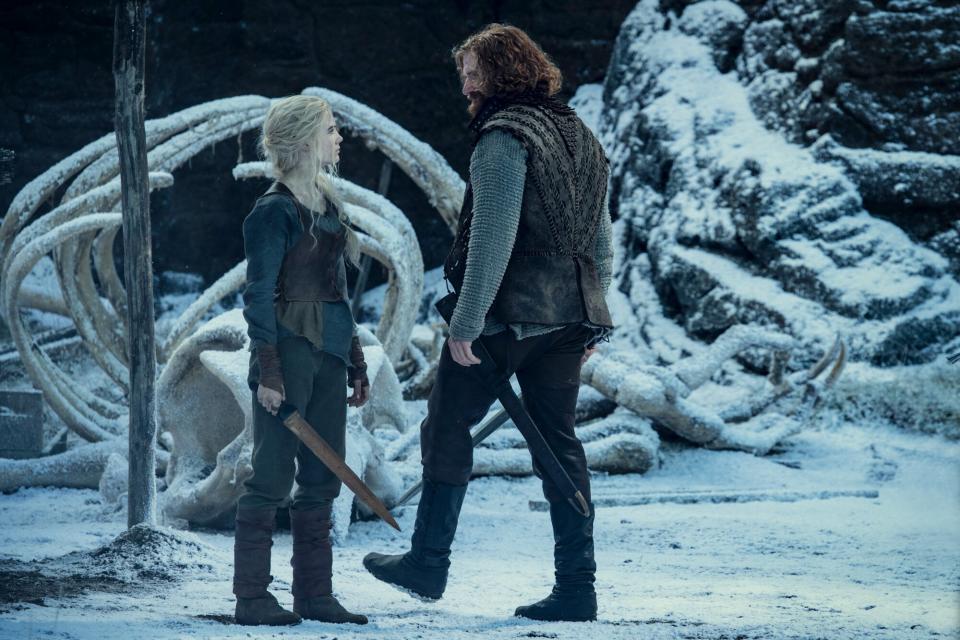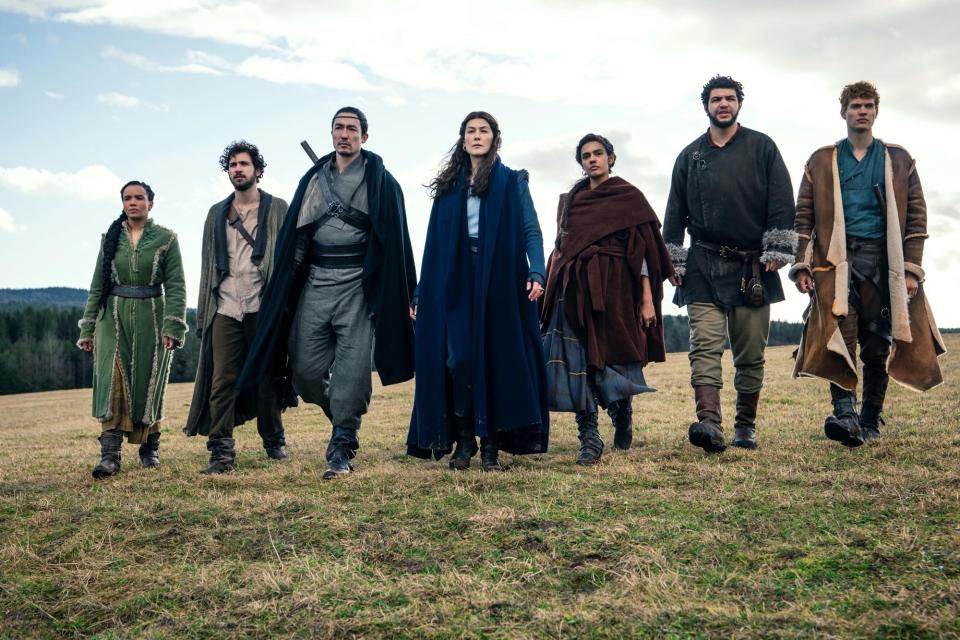Inside the quest for TV's next big fantasy hit

- Oops!Something went wrong.Please try again later.
Once upon a time…fantasy was a genre of entertainment that was practically banished from the realm of television. Even the delightfully cheesy sword-and-sorcery epics like Hercules: The Legendary Journeys, Xena: Warrior Princess, and Highlander: The Series that once aired at weird times on weird channels thanks to the wonders of syndication back in the 1990s had vanished, as if some evil network exec had cast a spell over the entire medium. All seemed lost.
And then came Game of Thrones. Just as The Sopranos successfully imported the gangster genre to the small screen, the hottest HBO show of the 2010s brought a big-budget and big-tent approach to mythical storytelling. In the process, showrunners David Benioff and D.B. Weiss turned George R.R. Martin's book series about the power struggle for the Iron Throne of Westeros into not only the most popular television show in the world (watched in more than 170 countries) but also the most decorated (a record 59 Emmy wins).
"What Game of Thrones did so brilliantly was to take a complex fantasy story and spool it out in a way that was broadly accessible and yet incredibly elevated," Marc Resteghini, head of U.S. TV development at Amazon Studios, says with audible awe. "It's a credit to them in terms of executing at an A+ level in a way that brought fantasy to this huge audience and proved that globally there was a real hunger for it."

Illustration by Kiuyan Ran for EW 'The Witcher,' 'House of the Dragon,' 'Lord of the Rings,' and 'Wheel of Time' are all trying to be the next TV fantasy success
But now that Game of Thrones is gone, has audience hunger for such material gone with it? Studios are betting the answer is no. Amazon's series adaptation of Robert Jordan's The Wheel of Time books — a noted influence on Martin's writing — premieres Friday, and the e-commerce giant also has a new Lord of the Rings show debuting next year.
Meanwhile, HBO is going back to the Westeros well in 2022 with House of the Dragon, a prequel series about the glory days of House Targaryen based on Martin's 2018 novel Fire & Blood — and the network has more spin-offs in development, even if they won't say exactly how many.
"George R.R. Martin created a very large and detailed universe. What's great about it is there are road maps and histories and characters that lend themselves to adapting for TV," HBO's chief content officer Casey Bloys told EW earlier this year. "I'd rather not come up with an arbitrary number [of sequels]. I really try to talk to each team about, what are the stories we're telling? What are the characters worth highlighting? The number of shows that I want is the number of shows that are good."

Ollie Upton/HBO Emma D'Arcy and Matt Smith in 'House of the Dragon'
Speaking of quality control, can House of the Dragon recapture the passionate Game of Thrones fan base after all the fiery reactions to dragon-riding Daenerys Targaryen (Emilia Clarke) burning a city to the ground rather than saving it? Sean T. Collins, a TV critic who cohosts the Westeros-themed podcast The Boiled Leather Audio Hour, believes the prequel could actually build on the original's controversial conclusion.
"Ironically, I think Dany's meltdown will help prepare people for House of the Dragon," Collins says. "You have a lot more people like Dany melting down; there's big dragon action, and cities get lit on fire. People unhappy with the way Game of Thrones ended could reevaluate it once they see this new show and are like, 'Oh, that's how the Targaryens operate. I get it now.'"
Building a franchise of multiple stories set in the same universe is a model that's worked wonderfully for Marvel's superheroes, and HBO isn't the only platform trying to build a fantasy equivalent. In December 2019, Netflix launched the first season of The Witcher — starring Henry Cavill as the monster hunter Geralt of Rivia — based on a book series from Polish author Andrzej Sapkowski. The show proved so successful (Netflix said it was viewed in 76 million households in its first month alone) that the streamer has since released an anime prequel film and has more spin-offs on the way.

Netflix Freya Allan's Ciri and Paul Bullion's Lambert in 'The Witcher' season 2
"Sapkowski created this very rich world — but in some ways only hinted at the potential of it," says Netflix executive Kelly Luegenbiehl. On top of that, the Witcher author imbued his novels with a unique perspective that aids Netflix's goal of reaching a global audience. "There is that kind of Slavic tonality to the series that distinguishes it from other fantasy. Audiences really responded to the fact that all of these characters really live in this gray area."
Between Sapkowski's books and the many popular Witcher video games, Netflix has a lot of source material to riff on as it constructs its own cinematic universe. So does Amazon when it comes to both The Wheel of Time (Jordan's series stretches to more than 14 volumes) and Lord of the Rings. While director Peter Jackson has already produced definitive big-screen takes on J.R.R. Tolkien's legendary trilogy, Amazon has assumed the position of the dragon Smaug, in that it is sitting on a treasure trove of fresh Middle-earth mythology.
Of course, that treasure did not come cheap, with the streamer shelling out a staggering $250 million just to secure the rights to the material, and then another $464 million on production costs for season 1 — indicating they believe there's still a massive mainstream audience beyond the Dungeons & Dragons set. Both The Wheel of Time and The Lord of the Rings have already been renewed for second seasons.

Jan Thijs/Amazon Studios Rosamund Pike leads the cast of Amazon's 'Wheel of Time' as the mystic Moiraine
"For us it's really about earning credibility with our audience and fans around the world by making a commitment to delivering these big shows with breadth and scope to the storytelling," Resteghini says of the Amazon team. "To do that well, you have to think long-term — you can't just be thinking about the first season."
But can either of Amazon's new fantasy entries match Game of Thrones' success? "I wish we could capture that lightning in a bottle every time," Resteghini says. "But we don't chase that."
Whether anyone will admit it or not, the chase is already on.
—Additional reporting by Nick Romano
A version of this story appears in Entertainment Weekly's December issue, on newsstands now and available to order here. Don't forget to subscribe for more exclusive interviews and photos, only in EW.
Related content:

